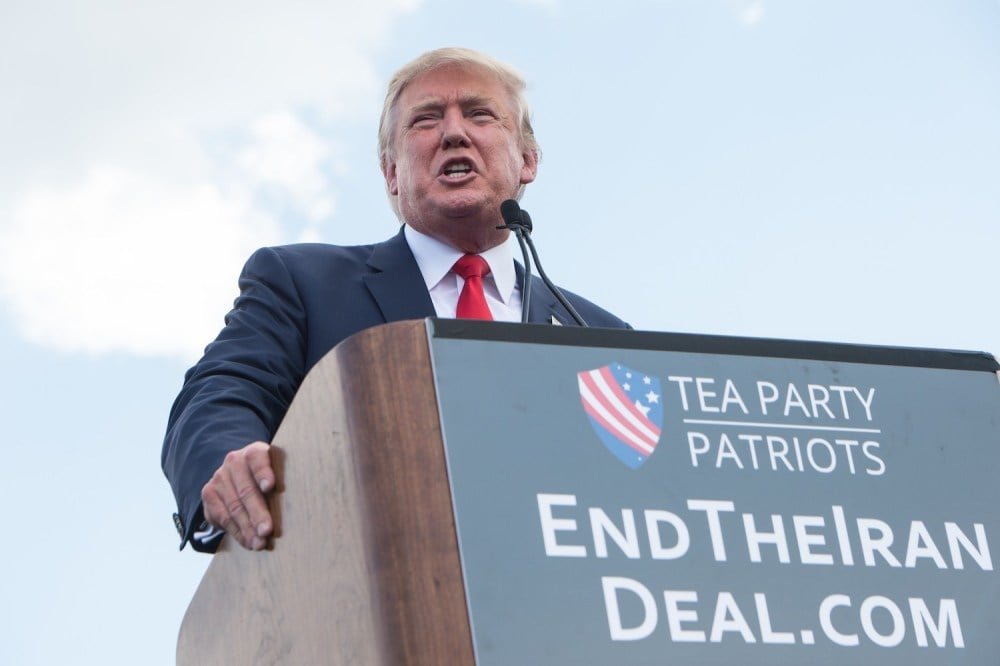He wants maximum pressure on Tehran, but not blowback for the United States.

By Steven A. Cook, a columnist at Foreign Policy and the Eni Enrico Mattei senior fellow for Middle East and Africa studies at the Council on Foreign Relations.

Donald Trump speaks at a rally organized by the Tea Party Patriots against the Iran nuclear deal in front of the Capitol in Washington, D.C., on September 9, 2015. NICHOLAS KAMM/AFP via Getty Images
President-elect Donald Trump’s Iran policy during his first term was never as bellicose as his rhetoric. His “maximum pressure” campaign was mostly similar to former President Barack Obama’s application of sanctions that brought the Iranians to the negotiating table and resulted in the 2015 JCPOA nuclear deal.
Just because Trump called that agreement the “worst deal ever” did not mean that he wanted to pursue regime change in Tehran, however. Rather, he wanted to negotiate a better deal with the Iranians, one that allowed him say his nuclear deal was superior to Obama’s nuclear deal. Trump was otherwise quite dovish on Iran. At moments when it would have been legitimate for Trump to use military force—after the IRGC seized oil tankers, mined the Persian Gulf, shot down an American drone operating in international airspace, and bombed Saudi oil facilities—the president chose (with bipartisan support) not to respond.
President-elect Donald Trump’s Iran policy during his first term was never as bellicose as his rhetoric. His “maximum pressure” campaign was mostly similar to former President Barack Obama’s application of sanctions that brought the Iranians to the negotiating table and resulted in the 2015 JCPOA nuclear deal.
Just because Trump called that agreement the “worst deal ever” did not mean that he wanted to pursue regime change in Tehran, however. Rather, he wanted to negotiate a better deal with the Iranians, one that allowed him say his nuclear deal was superior to Obama’s nuclear deal. Trump was otherwise quite dovish on Iran. At moments when it would have been legitimate for Trump to use military force—after the IRGC seized oil tankers, mined the Persian Gulf, shot down an American drone operating in international airspace, and bombed Saudi oil facilities—the president chose (with bipartisan support) not to respond.
There are still comprehensive sanctions on Iran, but the Biden administration has tended to look the other way at Iran’s oil sales. That had everything to do with the political calculations of a president who was stung early on in his administration by high energy prices. The collective pain of Americans at the gas pump contributed to Biden’s persistently low approval rating.
It remains an open question if Trump would risk the same through tougher sanctions enforcement. It depends on how he calculates his parochial interests: Does he want to be the guy who got “the better deal”—consistent with his self-image as master dealmaker—or does he want to ensure that Americans enjoy cheap oil and gas? Does he think he can do both? Only President-elect Trump could know the answers to those questions—and he may not either.
This post is part of FP’s live coverage with global updates and analysis throughout the U.S. election. Follow along here.
Steven A. Cook is a columnist at Foreign Policy and the Eni Enrico Mattei senior fellow for Middle East and Africa studies at the Council on Foreign Relations. His latest book, The End of Ambition: America’s Past, Present, and Future in the Middle East, will be published in June 2024. X: @stevenacook
More from Foreign Policy

Russia Can’t Keep Spending Like This for Long
Moscow is depleting its rainy-day savings to plug its war-induced fiscal deficit while preserving social stability.

The Next AI Debate Is About Geopolitics
Data might be the “new oil,” but nations—not nature—will decide where to build data centers.

The Enduring Mystery of Trump’s Relationship With Russia
After years of government investigations, we still don’t know if the former president is actually in Putin’s pocket.

The Case for the Greater West
Washington should abandon liberal universalism and work with the empire it already has.
Trending
![]()
Sign up for World Brief
FP’s flagship evening newsletter guiding you through the most important world stories of the day, written by Alexandra Sharp. Delivered weekdays.
By submitting your email, you agree to the Privacy Policy and Terms of Use and to receive email correspondence from us. You may opt out at any time.
OTHER SUBSCRIPTION OPTIONS
